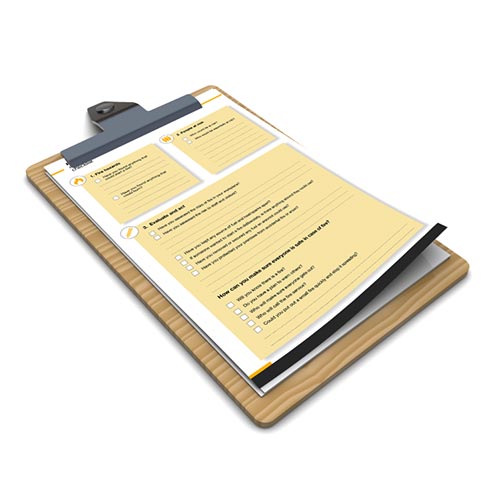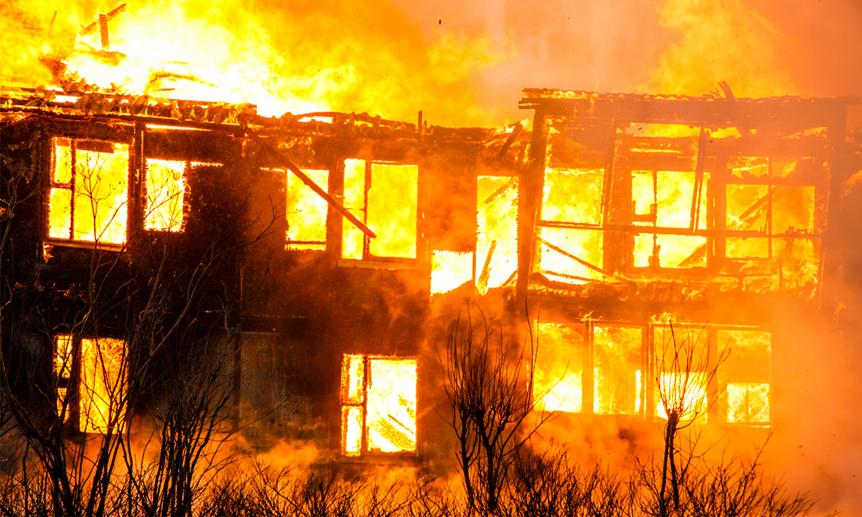Most fires are preventable. It’s important to explore the most common causes of fire so that the appropriate prevention measures can be put in place.
How do fires start?
For a fire to start it needs a source of ignition, a source of fuel and a source of oxygen. For example, if a smoker falls asleep with a cigarette still lit, and sets fire to the sofa, the cigarette is the source of ignition, the material on the sofa is the source of fuel and the air is the source of oxygen. Unchecked, this fire will spread quickly.
To prevent fire, sources of ignition, fuel and oxygen need to be kept apart as much as possible. Obviously this is difficult for oxygen, as it is in the air all around us, but it’s important to always think carefully about what possible sources of ignition are in your building, as well as thinking about what will allow a fire to spread once it has been ignited.
Common causes of fire
According to Fire and Rescue statistics from 2016/17, the four most common causes of accidental fires in non-dwelling properties were:
1. Faulty appliances and leads
2. Faulty fuel supply
3. Misuse of equipment or appliances
4. Placing articles too close to heat
Faulty appliances and leads
Examples of this most common cause of fire include:
- Frayed wiring
- Overloaded sockets
- Old appliances
- Damaged plugs
- Faulty appliances
Prevention tips
Damaged wiring can overheat and cause sparks. If you spot frayed wiring or overloaded sockets, these need to be replaced/removed. It’s important that appliances are regularly checked by an electrician. Annual portable appliance testing (PAT) needs to be done. Replace any faulty equipment and keep an eye out for any product recalls.
Faulty fuel supply
Examples include:
- Gas leaks
- Electrical supply problem
- Defective fuel supply to an electrical appliance
- Leaking fuel e.g. petrol in a garage
Prevention tips
Regular servicing of all electricity and gas appliances is essential. Make sure everything works correctly, and if not you’ll need to replace with new and safe appliances. Make sure any repair work is carried out by a qualified heating engineer or electrician.
Any spills must be cleaned thoroughly, particularly if hot work takes place in your workplace.
Misuse of equipment or appliances
Examples of this include:
- Spills on electrical equipment
- Phones left to charge too long
- Portable heaters left on
- Dirty ovens and microwaves
- Lint tray in tumble dryer
Prevention tips
Switch off electrical equipment when not in use, at the wall if possible. Unplug if you can. Don’t put something hot near something that can catch fire and keep drinks away from electrical equipment to avoid dangerous spills.
In the kitchen, make sure cooking is never left unattended. Keep ovens and microwaves clean, as grease and dirt can cause fires. Toasters often set off the fire alarm unnecessarily so keep these on a low browning setting and regularly empty the crumb tray.
Make sure appliances are regularly checked and serviced. Tumble dryers are a common source of fire, so clean the lint tray daily.
Keep areas tidy, as dirt and dust on electrical equipment can cause it to overheat. Make sure your building is cleaned regularly.
Placing articles too close to heat
Examples include:
- Tea towel near cooking appliances
- Candles knocked over
- Tin foil at bottom of oven
- Clothes on heater
Prevention tips
Keep in mind that It’s not just heaters and ovens that generate heat, electrical equipment does too.
Ensure paper is placed or stored away from anything that generates heat. Don’t put clothes on heating devices. Avoid using tin foil on or near the bottom of the oven as this can ignite. Common sense is all you need for this one, if it’s something that gets hot, store anything flammable away from it.
Deliberate fires
It’s also important to consider the possibility of arson. Install sprinkler systems where possible, and have CCTV as a deterrent. Don’t give intruders anything they can set fire to; keep rubbish locked away and inaccessible.
Before leaving for the day, make sure your building is securely locked, and that all windows are closed.
Examples of fuel sources in the workplace
- Paper
- Textiles (curtains, carpets etc)
- Rubbish and waste
- Flammable substances (paint, cleaning materials, solvents)
Safety measures to prevent fire
Flammable substances should be safely stored away from anything that can cause fire to spread, preferably in a locked cupboard.
Don’t forget about the dangers of smoking. Keep the smoking area well away from the main building and provide a place for cigarettes to be thoroughly extinguished.
Make sure your business has an up-to-date fire risk assessment. This includes a written record of potential sources of ignition, fuel and oxygen and how you can reduce or remove any risks.
By keeping your risk assessment up-to-date, and running regular fire safety training, you can keep everyone informed and safe.








An excellent article!!